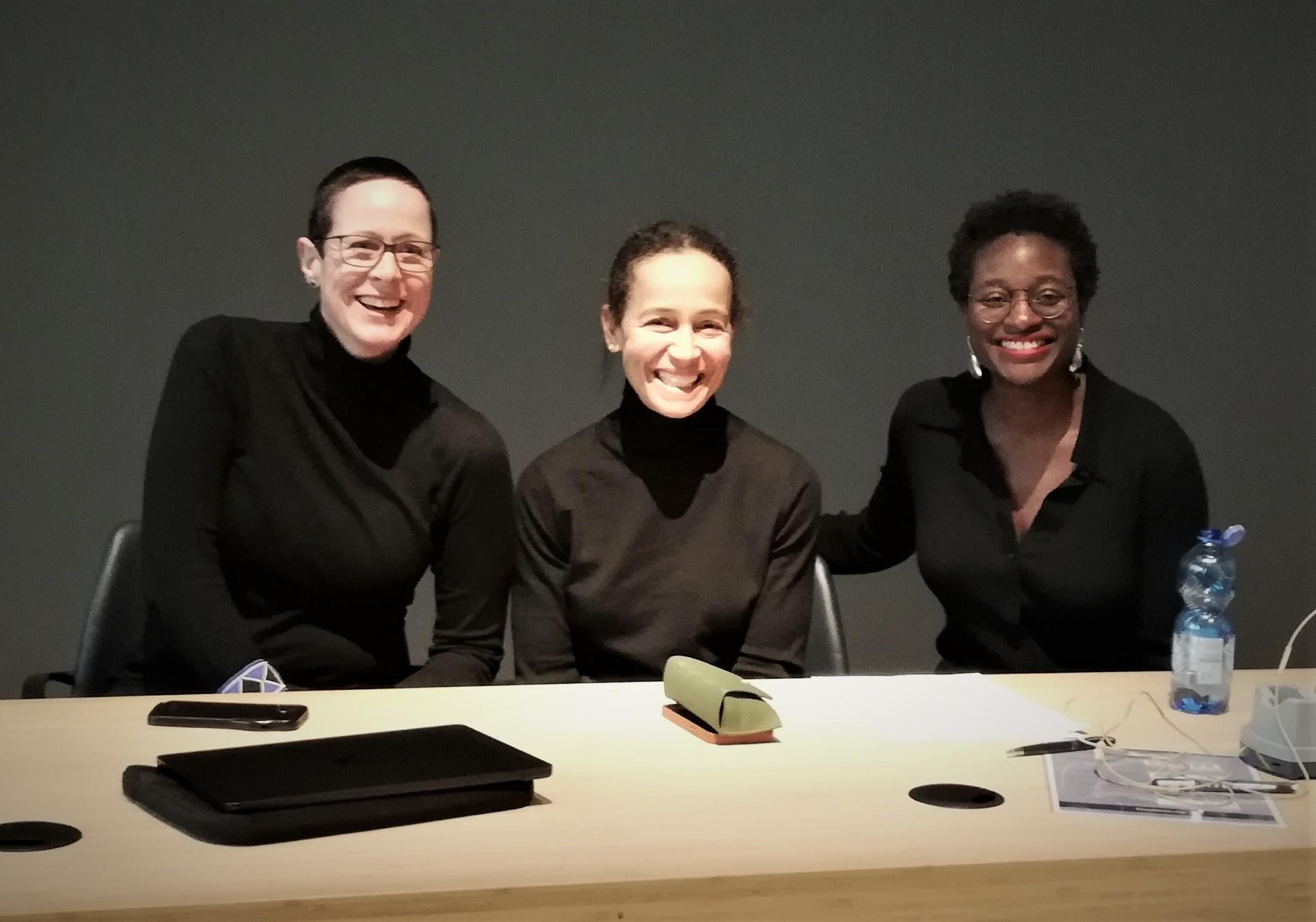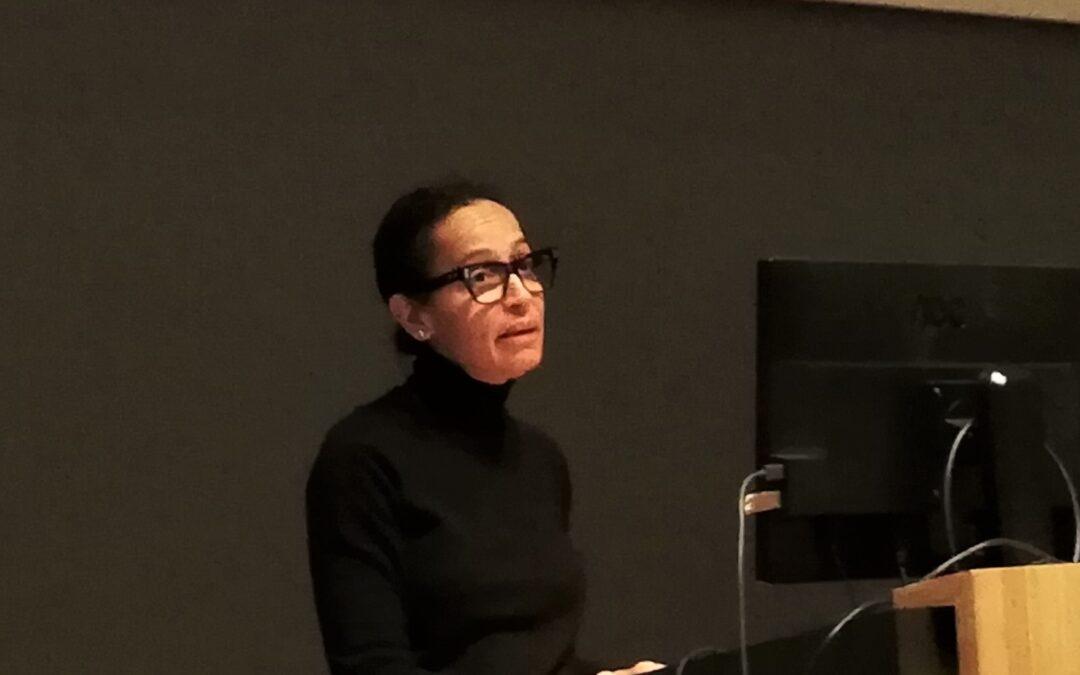On 10 March 2023, Anne-Maria Makhulu presented the lecture From Epistemicide to Epistemological Disobedience for which the invitation had been sent out in February. The lecture focused on the importance of citing black women scholars in academic publications. The lecture was followed by a response of Naomi van Stapele and a short Q&A. The meeting was organised by Jasmijn Rana, Lova chair, in cooperation with Densua Mumford of the Decolonising Collective Leiden and Andrew Littlejohn of the Leiden Institute for Cultural Anthropology and Development Sociology.
Densua Mumford acted as moderator during the meeting which was held in a lecture hall of the Wijnhaven Building at Campus The Hague of Leiden University. About fifteen persons attended the meeting in the room while around thirty other persons followed the meeting online.
Anne-Maria Makhulu stated that nowadays docolonising is an important focus of her work. It is important to undo institutionalised knowledge-power systems of racism and misogyny and citing black women is an important aspect of this. Current citational politics invisibilise specific ideas and theories and support racial capitalism. This critique was mostly developed outside of the discipline and departments of anthropology. Black anthropology is not recognized as anthropology and the othering of women is still going on. Makhulu wants to explore the underlying mechanisms of this. One of these mechanisms are departmental appointments; another are citational practices that reproduce systems of epistemic authority. Which sources and scholars are cited and which not provide a lot of information about the author of a publication and publishers. Makhulu closed her lecture with showing a quote of Faye Harrison (from the book Outsider Within, Reworking Anthropology in the Global Age, 2008) about ’misogynoir’ and the politics of citation. If we want to decolonise anthropology, it is much needed to break down hierarchical structures and research the intellectual genealogy of ideas and theories.
In her response to Makhulu’s lecture, Naomi van Stapele shared her reluctance of responding to this lecture and stated that she could only do so from her own perspective and experience as a white Dutch scholar. Van Stapele is involved in anthropological research with sex workers and activists who are black, of colour, and queer in the Nairobi ghetto of Mathare, Kenya. Half her life is there, the other half in the Netherlands. She explained her own intellectual genealogy by narrating about the various collectives she works with. During her PhD research at a Dutch university, she soon discovered that making her research in Mathare a piece of collaborative work was not feasible, because the preferences and priorities of her interlocutors in Kenya and of her academic supervisors in the Netherlands differed too much. Yet, people in Mathare decided to cooperate in her research. After the completion of her PhD research Van Stapele is now working with her friends there on a book; this time on their terms. In this project she feels responsible for organising funds for the people who contribute to the research and the writing; the book will be a product of collective authorship and not focused on an academic audience, but on feminists, queer activists, and a wider audience. She enjoys working closely together with such a diverse group of people in Mathare and uses these experiences in her work with students in the Hague who are also very diverse, with their own preferences and priorities. This is another side of decolonising anthropology.
In the discussion after the lecture, several topics came up. In response to the question of what epistemic disobedience could look like, Makhulu mentioned three measures she uses herself. The first is a critical deconstruction of ‘big books’: how have ideas and theories been created and by whom? The second is ethical responsibility: caring for and supporting students from many different backgrounds. The third concerns acknowledging the split minority women in the USA experience between the current academic world and their black and indigenous background. Delinking is difficult, gaining sovereignty and autonomy as an academic scholar are so important. This latter issue was also discussed later in response to a question about citation politics in publications and how to handle with non-written oral sources which are silenced in a context of struggle and violence. Makhulu shared her own personal struggle to diverge from the dominant referencing patterns in her research on protests in Cape Town, South Africa. Citation is a kind of interaction, one of many modes to discuss and debate. Being faculty now, she has some capacity to speak and to analyse, although this is not always that easy. Makhulu stated that she also learns a lot from her, mostly graduate, students in the dialogic teaching she applies. Van Stapele agreed with this by sharing her experience with students in The Hague and in Nairobi. Giving space to students is so important and she tries to find grants and funds for students to acknowledge their contributions to collaborative research projects.

Naomi van Stapele, Anna-Maria Makhulu and Densua Mumford at the end of the event. Picture by Ina Keuper
